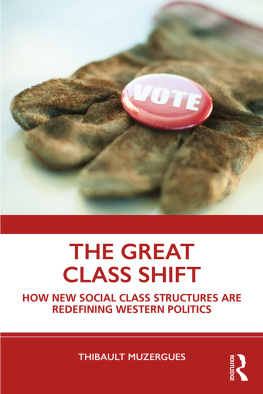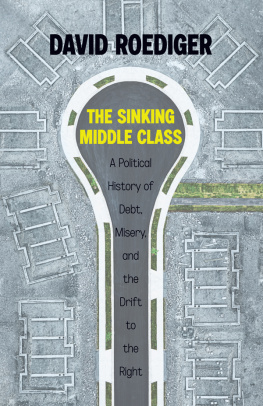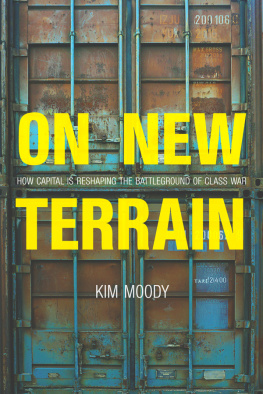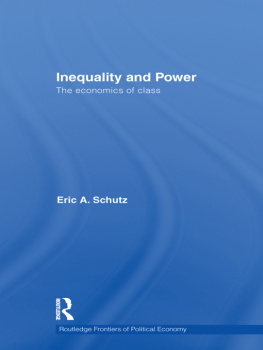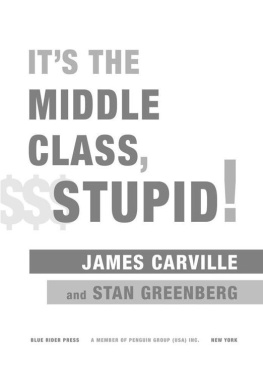Contents
Page List
Guide

Thibault Muzergues is an insightful observer of people and politics in the transatlantic space. Fluent in American and European trends, he examines the four warring sub-cultureseach pursuing their own righteous revolutionthat are pulling our societies apart.
Justin Gest
George Mason University, USA, Author of The New Minority
If you want to understand the new social classes dominating todays heated political debate, look no further than this excellent analysis by Thibault Muzergues. By uncovering the structural fault lines underlying the political earthquakes since 2008, he provides the reader with a detailed map not only to the recent past, but also to navigate our political future.
Josef Lentsch
Managing Partner of the Innovation in Politics Institute, Germany, Author of Political Entrepreneurship
Western societies have changed profoundly over the past quarter century. But the social sciences have not revised their categories of analysis. This is precisely the great interest of Thibault Muzergues book. It invites us to rethink social stratification to better understand democratic politics in the 21st century.
Dominique Reyni
Sciences Po Paris, France
Thibault Muzergues has penetrated beneath the surface of western societies to outline the new cleavages that are neither just socio-economic nor just socio-cultural but a complex mixture of the two. It is an important book, written with clarity and insight and with an impressive inside knowledge spanning much of the modern west.
David Goodhart
Head of Demography, Immigration & Integration at the Policy Institute, UK, Author of The Road to Somewhere
THE GREAT CLASS SHIFT
This thought-provoking book offers a new global approach to understand how four social class structures have rocked our political systems, to the extent that no politician or political party can exist today without claiming to be speaking on their behalf, and no politician can hope to win an electoral majority without building a coalition among these classes.
Based on a four-fold analysis Urban and Liberal Creatives, Suburban Middle Class, White Working Class, and the Millennials this book shows that while many have focused on a supply-side vision of politics to explain the upheavals in our political party systems, a vision centered on demand and the Weberian take on political parties as vehicles for class interests is more compelling. In 2016, our political world was changed forever by the victories of Brexit in the UK and Donald Trump in the United States. Far from being confined to the Anglosphere, however, changes have also rocked the political landscapes in Europe. As the crisis of 2008 has shaken the foundations of Western societies, shrinking the size of the previously all-powerful middle class, new classes have emerged, and with them a new political demand that new (or old) parties have tried to satisfy.
This book will be of key interest to political practitioners (politicians, advisors/consultants, journalists, political pundits, party builders, and government officials) and more broadly to academics, students, and readers of European and Western politics, political sociology, party politics and political parties, and electoral demographics.
Thibault Muzergues is Europe program director at the International Republican Institutes Europe Regional Office, Austria.
THE GREAT CLASS SHIFT
How New Social Class Structures are Redefining Western Politics
Thibault Muzergues
First published 2020
by Routledge
2 Park Square, Milton Park, Abingdon, Oxon OX14 4RN
and by Routledge
52 Vanderbilt Avenue, New York, NY 10017
Routledge is an imprint of the Taylor & Francis Group, an informa business
2020 Thibault Muzergues
The right of Thibault Muzergues to be identified as author of this work has been asserted by him in accordance with sections 77 and 78 of the Copyright, Designs and Patents Act 1988.
Original French language copyright version remains with Le Bord de lEau Editions and Mich et Maf scrl (MARQUE BELGE).
All rights reserved. No part of this book may be reprinted or reproduced or utilised in any form or by any electronic, mechanical, or other means, now known or hereafter invented, including photocopying and recording, or in any information storage or retrieval system, without permission in writing from the publishers.
Trademark notice: Product or corporate names may be trademarks or registered trademarks, and are used only for identification and explanation without intent to infringe.
British Library Cataloguing in Publication Data
A catalogue record for this book is available from the British Library
Library of Congress Cataloging in Publication Data
Names: Muzergues, Thibault, author.
Title: The great class shift : how new social class structures are redefining Western politics / Thibault Muzergues.
Other titles: Quadrature des classes. English
Description: New York : Routledge, 2019. | Includes bibliographical references and index.
Identifiers: LCCN 2019029094 (print) | LCCN 2019029095 (ebook) | ISBN 9780367342111 (hardcover) | ISBN 9780367342104 (paperback) | ISBN 9780429324482 (ebook)
Subjects: LCSH: Political participation--Social aspects--Western countries. | Social structure--Political aspects--Western countries. | Social classes--Western countries. | Political parties--Western countries. | Elections--Social aspects--Western countries. | Western countries--Politics and government--21st century. Classification: LCC JF799 .M8913 2020 (print) | LCC JF799 (ebook) | DDC 323/.042091821--dc23 LC record available at https://lccn.loc.gov/2019029094 LC ebook record available at https://lccn.loc.gov/2019029095
ISBN: 978-0-367-34211-1 (hbk)
ISBN: 978-0-367-34210-4 (pbk)
ISBN: 978-0-429-32448-2 (ebk)
Typeset in Bembo
by Lumina Datamatics Limited
This English translation has been facilitated by ALDE Party with the financial support of the European Parliament. The sole liability rests with the author. The European Parliament is not responsible for any use that may be made of the information contained therein.
To Alisa Muzergues
CONTENTS
PART I
Class shifting: How four social classes came to redefine our electoral landscapes
PART II
Falling apart or coming together?: Coalition dilemmas for election victory in a four-class system
Conventional wisdom in politics these days has it that the left and the right have disappeared and been replaced by proponents of open and closed societies. As is the case with many clichs, there is a grain of truth to this. In European politics, the struggle between open and closed political parties translates into a clash between pro-Europeans and nationalists. The former, of which I am one, believe that the future of sovereignty lies in sharing it at the European level, while the latter believe that the nation-state, as it was conceived in the seventeenth century, ought to remain the cornerstone of European politics.

